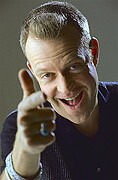
FRIDAY, Jan. 14 (HealthDay News) — If you really want that job, watch your posture.
How you stand and sit may affect how you feel about yourself — and in turn, how well you’ll perform in an interview during these tough economic times, according to a new study.
Researchers at the Kellogg School of Management at Northwestern University in Illinois found that undergraduates who were posed in “expansive” positions — arms extended and one leg casually crossed over the knee — scored higher on variables measuring their sense of power, abstract thinking and willingness to take action than their peers posed in “constricted” positions, with hands under their thighs, dropped shoulders, and feet scrunched together.
In three different experiments, the research team showed that expansive physical posture — specifically, positions that open up the body and take up space — can trigger a person’s sense of power more than his or her role or hierarchical position, such as being the boss.
“Previous research has shown basically that there are many ways we can increase our sense of power,” said study co-author Li Huang, a doctoral candidate at the school.
“Basically we found that posture is the factor that determines whether or not someone will take action,” said Huang. “Role did not predict it.”
Willingness to act and the ability to think abstractly are established criteria in research for measuring power, according to the study, published in the January issue of Psychological Science.
Each experiment involved between 57 and 77 participants and included men and women. For the most part, the results were similar for both sexes, said Huang.
Study subjects were randomly assigned the role of employee or boss prior to participating in various activities. They were told they would either give directions, in the case of the boss, or follow directions, in the case of an employee, while trying to solve a puzzle. The impact of role versus posture was then measured in a series of other activities.
In one experiment, subjects were posed in expansive and constricted postures and then asked to complete seven word fragments with the first word that came to mind. Points were awarded for power-related words only, and those who had been in a power pose before the test scored higher.
In another experiment, participants had to decide whether or not to take a card during a game of blackjack and were asked to identify objects that were partially concealed in fragmented pictures. Taking a card scored as a willingness to act. Identification of concealed objects was a measure of abstract thinking. In both cases, those who had been posed expansively scored higher.
And in a third experiment, participants were assigned to recall either a time in which they had control over someone or an incident in which someone had power over them. Next they had to decide whether to take action in three scenarios, including leaving the site of a plane crash to get help or joining a movement to free someone unjustly imprisoned. Although the memories of past power or subordination had no significant effect on the participants’ choices, researchers found that those in an expansive posture position were again more likely to take action than those in the constricted position.
In humans and animals, body “expansiveness seems to be evolutionarily ‘paired’ with power,” according to the study, and thus has “a strong effect, even in humans, on behavior.”
“People tend to think about power as something you have based on a role in society or an organization,” said Amy J.C. Cuddy, an assistant professor at Harvard Business School. “What is pretty fascinating about these power-posing results tested against role-power is that postures [have a greater impact] on psychological power.”
“That’s a pretty dramatic finding,” added Cuddy, who teaches a course on psychological power, persuasion and influence at Harvard and has also done research on the effect of posture.
Her research, which is cited in the study, showed that power poses change functions in the endocrine system. Testosterone levels increased in both men and women, and levels of cortisol (the stress hormone) declined after subjects had been placed in “expansive” body postures, she said.
“We’re not trying to create alpha males or Gordon Gekkos,” said Cuddy, referring to the aggressive protagonist of the 1987 movie Wall Street. “It’s not a good move to go into an interview and try and dominate. You also don’t want to defer too much.” In such situations, people want to project “confidence and warmth,” she said.
Armed with the study’s findings, job seekers and frustrated middle managers trying to get ahead during the recession might want to size up their body language before asking for a new position.
Posture is “an elegant and simple solution” to increase a sense of power, said Cuddy.
More information
For posture exercises you can try at home, visit National Jewish Health.

